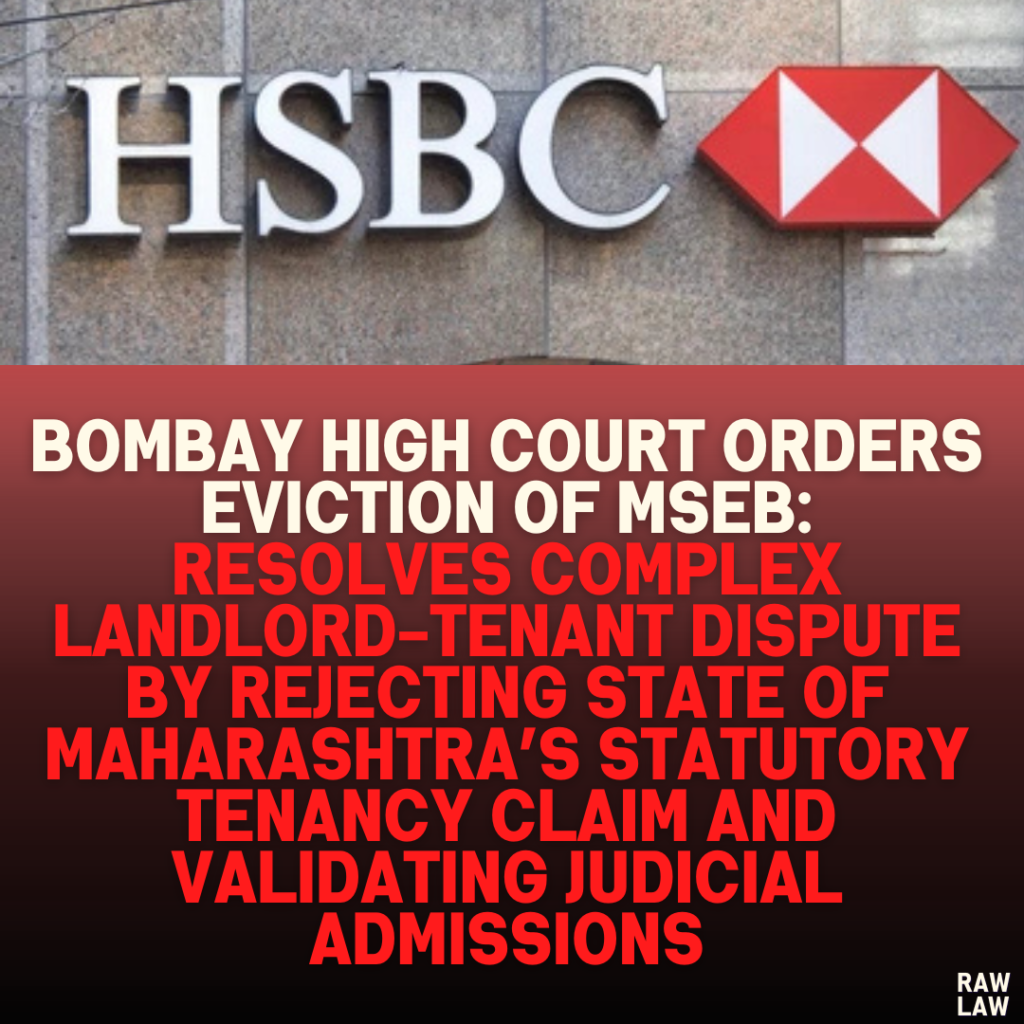Court’s Decision
The Bombay High Court resolved a longstanding landlord-tenant dispute involving HSBC Bank and Maharashtra State Electricity Board (MSEB). The Court held that MSEB, not the State of Maharashtra, was the tenant of the disputed premises. Based on judicial admissions and consistent evidence, the Court decreed MSEB’s eviction. It rejected the arguments of statutory tenancy or implied tenancy of the State Government and dismissed the lower courts’ findings of suppression of material facts and invalid notice.
Facts
- Lease History:
- In 1953, the Governor of Bombay was leased the premises in question for official purposes.
- MSEB began occupying the premises in 1954, paying rent directly to HSBC (then Mercantile Bank).
- The premises later became part of HSBC’s property following a corporate transition.
- Termination of Tenancy:
- HSBC issued notices in 1992 and reiterated them in 2000, seeking possession for business expansion.
- The notices claimed that under the Maharashtra Rent Control Act, 1999, MSEB lost statutory protection as a public sector entity with a paid-up share capital exceeding ₹1 crore.
- Legal Battle:
- MSEB contested the termination, claiming that the State of Maharashtra, not MSEB, was the statutory tenant.
- HSBC filed an eviction suit under Section 41 of the Presidency Small Causes Court Act, asserting that MSEB had no statutory protection and was liable for eviction.
- MSEB challenged the Small Causes Court jurisdiction and raised constitutional issues regarding Section 3(1)(b) of the Maharashtra Rent Control Act.
Issues
- Primary Tenant:
Whether MSEB or the State of Maharashtra was the actual tenant of the premises. - Loss of Statutory Protection:
Whether MSEB lost protection under Section 3(1)(b) of the Maharashtra Rent Control Act due to its financial standing. - Maintainability:
Whether the suit was maintainable without joining the State of Maharashtra as a necessary party.
Petitioner’s Arguments (HSBC):
- Admissions by MSEB:
MSEB admitted its tenancy in multiple instances, including written statements and correspondence with HSBC. - Payment of Rent:
MSEB paid rent directly to HSBC for decades, without any involvement from the State of Maharashtra. - Judicial Admissions:
HSBC argued that MSEB’s admissions, per Section 58 of the Indian Evidence Act, were binding and precluded further dispute over tenancy status. - Implied Surrender:
HSBC claimed that the State of Maharashtra’s tenancy, if any, had been impliedly surrendered when MSEB began paying rent and asserting tenancy rights. - Invalid Arguments:
MSEB’s claims of State tenancy were mutually destructive, as MSEB simultaneously sought tenancy protection and denied tenancy rights.
Respondent’s Arguments (MSEB):
- State as Tenant:
The tenancy originated with the Governor of Bombay, which passed to the State of Maharashtra under the States Reorganization Act. - Statutory Tenancy:
MSEB argued that the State remained a statutory tenant under the Maharashtra Rent Control Act, protecting it from eviction. - Improper Notice:
MSEB contended that the eviction notice was invalid, as it was not served on the State Government. - Transfer Scheme:
The 2005 Maharashtra Electricity Reforms Transfer Scheme vested the tenancy in the State Government, not MSEB.
Analysis of the Law
- Judicial Admissions (Indian Evidence Act, Section 58):
The Court emphasized the binding nature of MSEB’s admissions in its written statements and correspondence. It ruled that these admissions established MSEB as the tenant. - Implied Surrender (Transfer of Property Act):
By paying rent since 1954, MSEB impliedly surrendered the State’s tenancy rights. The Court relied on precedents to support the concept of implied surrender through conduct. - Statutory Protection:
The Court held that MSEB, as a public sector undertaking with significant resources, was excluded from rent protection under Section 3(1)(b) of the Maharashtra Rent Control Act. - Validity of Notice:
The Court found that the eviction notice met legal requirements under the Transfer of Property Act and did not require service on the State Government.
Precedent Analysis
- Nagindas Ramdas v. Dalpatram (1974):
Judicial admissions bind parties and require no further proof. - Pushpa Rani v. Bhagwanti Devi (1994):
Implied surrender can be inferred from conduct. - Leelabai Gajanan Pansare v. Oriental Insurance (2008):
Affirmed that entities excluded from statutory protections should vacate rented premises.
Court’s Reasoning
- The Court found that MSEB’s admissions in correspondence and written statements confirmed its tenancy status.
- The Small Causes Court and its appellate bench erred in focusing on minor factual omissions by HSBC while ignoring MSEB’s binding admissions.
- The absence of the State of Maharashtra as a party did not affect the suit’s maintainability, as the core dispute revolved around MSEB’s admissions.
Conclusion
The Court decreed MSEB’s eviction, holding it liable to vacate the premises. It dismissed claims of statutory protection under the Maharashtra Rent Control Act, finding that MSEB’s financial standing disqualified it from such benefits.
Implications
This judgment reinforces the importance of judicial admissions in landlord-tenant disputes and clarifies the exclusion of financially robust public sector entities from rent control protections. It sets a precedent for addressing tenancy disputes involving government agencies.
